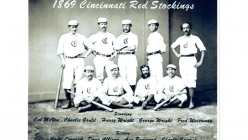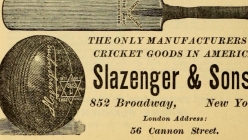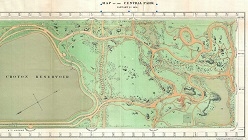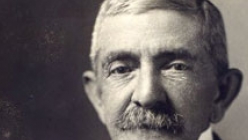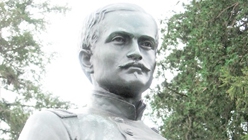USA Cricket: The cricketer who won the Medal of Honor
2013 Apr 05 by DreamCricket USA
Born in Ireland in 1838, Collis immigrated to the United States when he was fifteen and was soon caught up in the cricket fervor that was sweeping Philadelphia in the late 1850s, a time when the city fairgrounds overflowed every weekend with young Philadelphians playing game after game.
Now, you can get all the USA Cricket updates via Facebook. Also follow us on Twitter via @dreamcricket
By Tom Melville
For many reasons the American Civil War has been called the world’s first “modern war,” including the more obscure one that this was probably the first war in history that materially disrupted a country’s sporting life, which, in America of 1861, meant transitioning young men from the playing fields of cricket and baseball to the battlefields of Virginia and Tennessee.
Consequently, in this war of “brother against brother” there now appeared the unwelcome dimension of athlete against athlete, and the cricketers of the Cincinnati Cricket Club who, at the outbreak of the war, enrolled en masse into the Union Army, could very well, at some point and time, taken potshots at the Savannah Cricket Club players who had also enrolled, almost to a man, into the Confederate army.
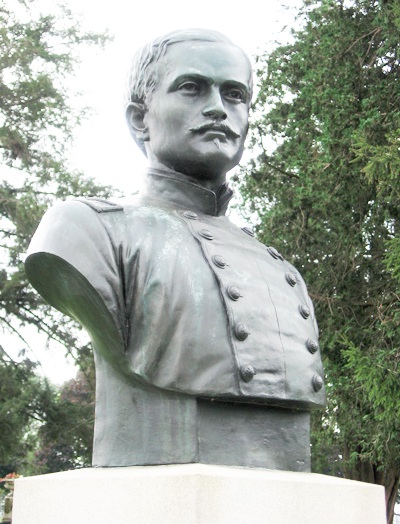 At least this probably ended, once and for all, any lingering ambivalence Americans may have had about the social efficacy of men playing children’s games, since the discipline and perseverance demanded on the athletic field, so it was claimed, was no better schooling for military success. At least this is how the New York Sunday Mercury saw it, certain that “our cricket and base-ball players will be the last to give out” in the fury of combat.
At least this probably ended, once and for all, any lingering ambivalence Americans may have had about the social efficacy of men playing children’s games, since the discipline and perseverance demanded on the athletic field, so it was claimed, was no better schooling for military success. At least this is how the New York Sunday Mercury saw it, certain that “our cricket and base-ball players will be the last to give out” in the fury of combat.
Pic (Right): The monument to Brevet Major General Charles Collis is southeast of Gettysburg in the National Cemetery. [Courtesy: Stone Sentinels, Gettysburg]
If this implies the obligation of giving “the last full measure” for the cause, it became a lethal reality for Sandie Pendleton, University of Virginia cricket club president and officer in Stonewall Jackson’s command, who died at the battle of Winchester in 1864, and Amherst College cricket club member Christopher Pennell who, as an officer in Grant’s army, never came home from the battle of Petersburg.
But if war is a human institution that necessarily produces many dead and a few heroes, some members of the American cricket fraternity thankfully ended the war on the positive side of this equation. Massachusetts abolitionist Thomas Wentworth Higginson and president of the Worcester Cricket Club, would command the first African-American regiment in the Union Army and, after the war, became the confidant of poet Emily Dickenson.
James Garfield left his teaching post where he had played recess cricket with his students (eyewitnesses report he wasn’t much of an athlete), joined the Union army, rose to the rank of general and eventually parlayed his military notoriety all the way to the White House.
A more explicitly battle scarred kind of notoriety came to another American cricketer, Charles H.T. Collis of Philadelphia.
Born in Ireland in 1838, Collis immigrated to the United States when he was fifteen and was soon caught up in the cricket fervor that was sweeping Philadelphia in the late 1850s, a time when the city fairgrounds overflowed every weekend with young Philadelphians playing game after game. A letter of his survives from this period in which he makes the portentous observation that, with some good coaching, these Philadelphia youngsters would be the cricketing equal of their English peers.
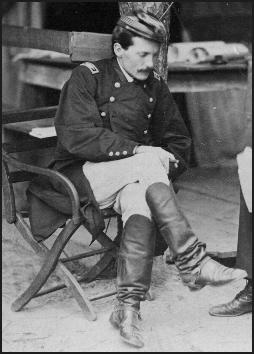 As a recent immigrant he was assigned to the “English” side that played against the “American” team in 1857, but within a couple of years he had evidently been accepted as fully American to gain a place on the Philadelphia 22 that played the All-England team touring North America in 1859. This was the Englishmen’s most closely contested match of their tour but it must not have been a happy one for Collis since he was out for a duck each of his innings.
As a recent immigrant he was assigned to the “English” side that played against the “American” team in 1857, but within a couple of years he had evidently been accepted as fully American to gain a place on the Philadelphia 22 that played the All-England team touring North America in 1859. This was the Englishmen’s most closely contested match of their tour but it must not have been a happy one for Collis since he was out for a duck each of his innings.
Pic (Right): Brevet Major General Charles Henry Tucker Collis
By the time they were finishing their final match in Rochester in October, the English cricketers were sharing the headlines with more ominous news; John Brown’s raid on Harpers Ferry, the one and final incident that left no more doubts America was going to spill blood over the issue of slavery and within little more than a year North and South were at War.
Collis must have been a popular person with the young men of Philadelphia since he was asked, at the war’s outbreak, to recruit and take command of an entire regiment, the 114th Pennsylvania.
His ability as a military commander came to the front in the battle of Fredericksburg in 1862, Collis showing more than expected bravery in this otherwise disastrous Union defeat to win him the Medal of Honor, a military award recently created by Congress.
Though wounded at the battle of Chancellorsville, and disabled for months by illness, Collis soldiered on, rising through the ranks and eventually finishing the war as a brigadier general.
After the war he returned to his legal career in Philadelphia and though not yet 30 at the war’s end he didn’t seem to have taken any further active involvement with cricket, though it’s hard to believe he didn’t take personal pleasure in seeing his adopted city reach the heights of its cricket glory during his lifetime.
He died in Philadelphia at the age 64, just a year before the Gentlemen of Philadelphia, during their England tour of 1903, would fulfill his ante-bellum prophesy for American cricket.
[Tom Melville is an American cricket player, teacher, and author of Cricket For Americans and The Tented Field: A History of Cricket in America. He’s been working with Americans at cricket for over thirty years. Opinions expressed in this article are those of the author.]
